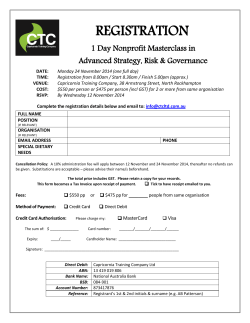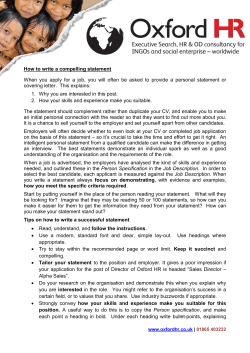
Evaluating External Quality Assurance and Continuing Professional Development
Evaluating External Quality Assurance and Continuing Professional Development Purchased copy will be the full version, without the watermark This handout will cover: • • • • • • • • Why evaluate EQA practice? Standardisation of practice Evaluating EQA practice What is reflective practice? What is continuing professional development? (CPD) Planning and maintaining CPD Reading list Website list Why evaluate EQA practice? To ensure: • • • • • a professional service is given to centres the EQA process is fair to all you are meeting awarding organisation and regulatory requirements you can learn from any incidents you can improve your practice. It is important to give a good service to your centres, and to maintain and improve on this where possible. However, the credibility of the awarding organisation must never be compromised. Standardisation of practice You need to ensure a standardised quality service is given to all your centres, the support you give to one centre should be similar to that you give to another. You must not show any favouritism or do things which are not ‘by the book’. You need to be fully aware of your awarding organisation’s policies and practices i.e. following all legal and other relevant requirements. The awarding organisation should provide you with guidance (either manual or electronic documents) and you should ensure you are familiar with it. You must not ask a centre to do something which is not a requirement just because you want them to do it. You can standardise your practice in the following ways: missing text You should ensure your centre staff are also standardising their practice in similar ways. E9006 (V2) - Copyright Ann Gravells - www.anngravells.co.uk SAMPLE ONLY – NOT TO BE ISSUED TO LEARNERS Page 1 of 4 Gravells A (2014) Achieving your Assessment and Quality Assurance Units (TAQA) London Learning Matters Evaluating EQA practice Evaluation is not another term for assessment; evaluation is of the process, whereas assessment is of the learner. Your awarding organisation might ask for feedback from your centres regarding the support you have given them – this might be used during your appraisal or a review. You can also ask for feedback from your centres to help you evaluate the service you are giving them. Obtaining the views of others will greatly assist you when reflecting upon your role as an EQA, and aid the standardisation process. missing text Always make sure you do something with your findings which will lead to an improvement. You should evaluate aspects such as: • • • • • how effective was my communication with the centre staff? do I keep adequate and accessible records? did I carry out everything I had planned to during a visit or a remote sample? did I deal with any awkward situations effectively? missing text You should evaluate the full EQA process for each centre you are responsible for. This includes contact before, during and after sampling activities. You will need to ensure the activities you used to carry out the EQA process were valid and reliable. You will need to ask yourself if you made a decision fairly and accurately, and followed all regulatory and awarding organisation requirements. What is reflective practice? It is an analysis of your actions which should lead to an improvement in practice, it can be written down, or just thought through. A straightforward method of reflection is to have an experience, then describe it, analyse it and revise it (EDAR) (Gravells 2014). This method incorporates the Who, What, When, Where, Why and How approach and should help you consider ways of changing and/or improving. • • • • Experience – a significant event or incident you would like to change or improve. Describe – aspects such as who was involved, what happened, when it happened and where it happened. Analyse – consider the experience deeper and ask yourself how it happened and why it happened. Revise – think about how you would do it differently if it happened again and then try this out if you have the opportunity. As a result, you might find your own skills improving, for example giving more effective, constructive and developmental feedback. E9006 (V2) - Copyright Ann Gravells - www.anngravells.co.uk SAMPLE ONLY – NOT TO BE ISSUED TO LEARNERS Page 2 of 4 Gravells A (2014) Achieving your Assessment and Quality Assurance Units (TAQA) London Learning Matters missing text What is continuing professional development? (CPD) • • It is a process of ensuring your EQA professional skills and knowledge are up to date. This includes your specialist subject, assessment and IQA knowledge, EQA practice, knowledge of awarding organisation and qualification requirements, as well as advances in new technology. As a professional, you need to continually update your skills and knowledge. This knowledge relates not only to your subject specialism, but your practice as an EQA, and your knowledge of assessment and internal quality assurance. CPD can be formal or informal missing text Keeping up to date with developments in your subject area, changes in legislation, changes in qualification standards and developments with ICT will assist your knowledge and practice. You also need to keep up to date with your awarding organisation's (AO) requirements to operate as an EQA. You will be expected to attend meetings, networking and standardisation activities organised by your AO. These might be by attending an event and/or by online activities. Planning and maintaining CPD Feedback from others and your own reflections will help you realise what CPD you need to undertake. You could shadow colleagues to observe how they carry out their EQA role, join professional associations, and carry out internet research regarding your specialist subject, assessment IQA and EQA practice. Activities could include: • • • • attending events, meetings, standardisation activities and training programmes e-learning activities evaluating feedback from peers and others missing text Records must always be kept of any CPD undertaken to be shown to your awarding organisation or regulatory bodies if requested. Reflecting upon EQA practice, taking account of feedback from others, evaluating practice and maintaining CPD will all contribute to becoming a more effective EQA. Reading list Gravells A (2014) Achieving your Assessment and Quality Assurance Units (TAQA) London Learning Matters E9006 (V2) - Copyright Ann Gravells - www.anngravells.co.uk SAMPLE ONLY – NOT TO BE ISSUED TO LEARNERS Page 3 of 4 Gravells A (2014) Achieving your Assessment and Quality Assurance Units (TAQA) London Learning Matters Roffey-Barentsen J & Malthouse R (2009) Reflective Practice in the Lifelong Learning Sector (2nd Edn) Exeter Learning Matters Scales et al (2011) Continuing Professional Development in the Lifelong Learning Sector Maidenhead McGraw Hill Wood J & Dickinson J (2011) Quality Assurance and Evaluation in the Lifelong Learning Sector Exeter Learning Matters Website list CPD - http://www.ifl.ac.uk/cpd Evaluation - http://www.businessballs.com/kirkpatricklearningevaluationmodel.htm Reflective practice - http://www.learningandteaching.info/learning/reflecti.htm E9006 (V2) - Copyright Ann Gravells - www.anngravells.co.uk SAMPLE ONLY – NOT TO BE ISSUED TO LEARNERS Page 4 of 4 Gravells A (2014) Achieving your Assessment and Quality Assurance Units (TAQA) London Learning Matters
© Copyright 2025









